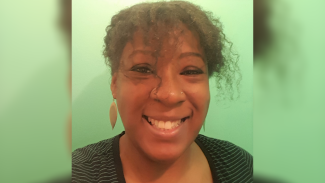My journey of coming out of my shell

Being interviewed for a podcast was a big step in Kelly Spencer's journey of acceptance. In this honest article, she tells us just how difficult a journey it can be.
My name is Kelly and I recently featured in an episode of the podcast 'Make Room For The Stuttering', which is now online. I'm really proud of doing it, and as a stutterer coming out of the closet, I thought it would be great to share it on the STAMMA site and tell my story.
Having stuttered from a young age, my only tactic of survival was to hide it at all costs and be covert.
I came across some other people who were talking about acceptance of stuttering, and that stammering was okay. This blew my mind, as it was a completely different stance to mine, one I had never considered before.
In my twenties I began to actively seek help for my stammer and read obsessively about how I could stop it. As well as having local speech therapy, I also did The Starfish Project course and was determined to fix and change my breathing and slow myself down.
I also got into spirituality and psychology around the same time, and I guess I hoped that it would also contribute to me being free of this 'speaking problem' that I felt was an obstacle.
Discovering other viewpoints
At some point however, I came across some other people who were talking about acceptance of stuttering, and that stammering was okay. This blew my mind, as it was a completely different stance to mine, one I had never considered before. It also lined up with some of the spiritual or personal development concepts that I had come across, around acceptance of self and being perfect as we are.
It made me feel so good and empowered hearing this approach from other stutterers, who I have to say were largely American.
I guess what I wanted was to be free of my speech being an issue at all, and just to live my life. Stuttering is only a part of me, and I didn't like it how it was taking up all of my attention and energy.
So for a while I watched lots of videos, listened to podcasts and took an active part in online groups. I was beginning to show my speech more. I even 'came out' about my stammer to some people in my personal life. But in the background there was still fear and avoidance of stuttering, and there was still a hope that it would go away and that I would be fluent.
Attention and energy
Eventually I got tired of it all, and just went back to not being involved in it. I guess what I wanted was to be free of my speech being an issue at all, and just to live my life. Stuttering is only a part of me, and I didn't like it how it was taking up all of my attention and energy. So I ended up just slipping back into my normal way of being, which was to hide that I stuttered.
As I've gone on with my life, and wanting to begin actually living, speaking has become necessary whereas before I was pretty much a recluse and didn't speak much.
This has called me back into the community — not to complain, not to talk about 'fixing' and breathing, etc, but simply to stutter and hear others stutter, which supports me to speak as I do, as I come out of my shell.
To grow professionally and in my personal life I have to engage and become verbal, and this is how I have had to find my voice, or rather, let it come out. And the voice that comes out will contain cluttering and stuttering. This has called me back into the community — not to complain, not to talk about 'fixing' and breathing, etc, but simply to stutter and hear others stutter, which supports me to speak as I do, as I come out of my shell.
I just want to add that I'm not against speech techniques; I'm personally in favour of strengthening the diaphragm to support better speech. But now, 'better speech' in my eyes, and being a good communicator, do not necessarily mean not stuttering. And this is my main feeling I guess, inclusion and embracing of stuttering first, technique for better communication, if wanted, second.
I hope the podcast episode that I did inspires or touches someone enough that they can also begin to embrace themselves, just as they are.
Listen to Kelly talk more about her experiences on the Make Room For The Stuttering: Women Who Stutter' podcast. In it, she goes by 'Rebekah', after changing her name because she stammered. Read her article 'I changed my name', in which she talks about reclaiming her birthname in her 40s.
The Starfish Project is one of the courses out there for stammering. To see the full list of options, see our One-to-one Adult Speech & Language Therapy and Adult Stammering Courses pages.
Read more Your Voice articles. Would you like to share your story? See how you can Submit Something For The Site.


































